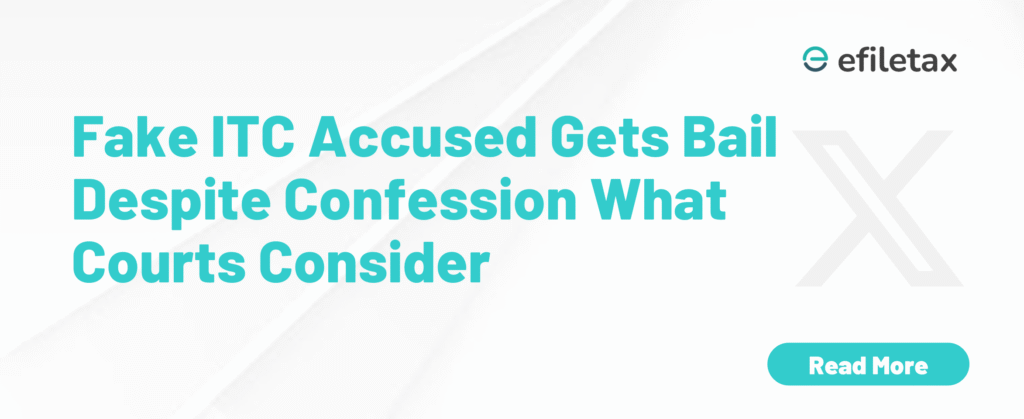
Regular Bail Granted in Fake ITC Case What Taxpayers Should Know
In a notable ruling, the Punjab & Haryana High Court granted regular bail in a fake Input Tax Credit (ITC) case, citing the accused’s confession, prolonged pre-trial custody, and slow judicial progress. The case sheds light on judicial discretion in GST fraud cases and the rights of the accused under criminal law.
Background of the Fake ITC Allegations
The accused was arrested in connection with availing and passing on fraudulent ITC worth over ₹10 crore by creating fake GST invoices without actual movement of goods.
Key facts of the case:
- The accused was in custody for over 10 months
- Confessional statement recorded under Section 70 of the CGST Act
- Investigation completed; charge sheet filed
- Trial unlikely to start soon due to judicial backlog
Court’s Key Observations on Bail Grant
The High Court considered the following while granting regular bail:
- No recovery pending from the accused
- Chargesheet already filed, so no further investigation required
- The accused’s continued detention would serve no purpose
- No proven risk of tampering with evidence or threat to witnesses
- Trial is likely to take long due to multiple accused and court delays
📌 Legal Reference: The Court relied on principles from the Supreme Court’s ruling in Sanjay Chandra v. CBI (2012), which emphasized the right to liberty and presumption of innocence until proven guilty.
Legal Insight: Bail under GST Fraud Cases
Under GST law, Section 132 of CGST Act criminalizes availing/passing fraudulent ITC above ₹5 crore as a non-bailable offence. However, regular bail can be granted under Section 439 of CrPC, based on:
- Nature of allegations
- Role of the accused
- Length of custody
- Stage of investigation/trial
In this case, all conditions tilted in favour of granting bail.
Focus Keyphrase Subheading: Regular Bail in Fake ITC Case
Here’s a quick breakdown of when regular bail in fake ITC case is likely to be granted:
| Criteria | Considered by Court? |
|---|---|
| Confessional statement | ✅ Yes |
| Recovery pending | ❌ No |
| Chargesheet filed | ✅ Yes |
| Tampering risk | ❌ No |
| Trial commencement | ❌ Not soon |
| Custody duration | ✅ Over 10 months |
Expert View: Bail Does Not Mean Acquittal
“Granting bail doesn’t dilute the offence. It only ensures the accused’s right to liberty during a delayed trial. Taxpayers must not treat this as a loophole, but as a check on arbitrary detention.”
— Senior Advocate on GST matters
Legal Sources Used
- CGST Act, Section 132
- Punjab & Haryana High Court Judgment (June 2025)
- Supreme Court ruling in Sanjay Chandra v. CBI (2012)
Summary
Regular bail was granted in a fake ITC case due to the accused’s confession, 10-month custody, and slow trial. The High Court emphasized liberty over prolonged detention, aligning with SC rulings.
FAQ Section
Q1. Can bail be granted in fake GST ITC cases?
Yes, courts may grant regular bail under CrPC if investigation is over and custody is no longer necessary.
Q2. Is confession under GST law valid ground for bail?
It can support the bail plea, especially if there’s no risk of evasion or tampering.
Q3. What is the punishment for fake ITC under GST?
Fraud over ₹5 crore can lead to 5 years imprisonment under Section 132.
Final Words
This case shows how Indian courts balance tax enforcement with constitutional rights. If you’re facing GST scrutiny, professional legal and compliance support is crucial.